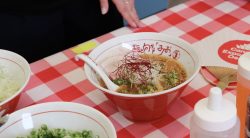By Sean Coombs
Expo Reporter
OSAKA, Japan — On a rainy Tuesday afternoon, the LiNGUA World Cafe nestled in a quiet corner of the Tennoji ward of Osaka has just emptied after the lunchtime rush.
Behind the counter, Ian Warney dips his ladle into a pot and then pours a hot helping of gravy onto a classic order of poutine.
If the classic Canadian delicacy poutine being on the menu isn’t a strong enough hint of Warney’s Canadian origins and the restaurant’s specialty, then the leftover Canada Day decorations and the extensive menu of Canadian favourites should provide further clues.
Founded just over 11 years ago, LiNGUA World Cafe is run by Warney and his wife Ulala Sasa, who have served poutine and other Canadian delights at this location since 2020, when they moved locations during the pandemic.

Running an independent, Canadian cafe in Osaka isn’t a task for the faint-hearted. Apart from economic difficulties like the pandemic and the devaluing of the yen, sourcing proper ingredients to make authentic dishes can be a challenge.
While ingredients for dishes like grilled cheese and burgers can be easily found, the classic cheese curds for authentic poutine had to be improvised with shredded cheeses.
“When Canadians come in, I get a little nervous and I have to give the caveat,” Warney said. “We use a mixed cheese, but everyone goes ‘oh that’s fine’.”
It’s a struggle that even the Canada pavilion at Expo has faced with its Air Canada-sponsored poutinerie. But Warney is certain the curd substitution isn’t a barrier to serving great poutine. The secret: “Keep the gravy fresh and don’t skimp on the portions.”
While the poutine at the Canada pavilion is available with many Japanese-inspired toppings, the poutine at LiNGUA World Cafe only has cheese and gravy, with diced chicken as an extra.
The cafe has improvised with other dishes too. Its Halifax-style donair, a special for Canada Day, has its meat mixed and cooked on site with a recipe curated from Japanese-sourced ingredients.

The cafe caters to a niche market in Osaka, as it’s one of only three distinctly Canadian eateries in the region.
The Canadian diaspora community in Osaka is similarly small, but Warney says his Canadian clientele is vibrant and diverse.
“You find regional rivalries that are prevalent back home seem to disappear when you’re here,” he said. “You get to see the same sort of people around a lot and it’s a good community.”
Warney’s partner Sasa agrees, noting that the cafe is a focal point for Canadian expats and tourists to gather and celebrate Canadian occasions.
With Canadian decorations like lanterns, posters, and even Expo merch adorning the cafe, Warney says he welcomes Canadian newcomers who’ve moved to Japan like he did.
“We’ve got some Canadian flags hanging around the place, and it’s nice to catch up and hear their stories of how they ended up in Japan and create that connection.”
“There is a lot of shared culture, which is one of the reasons why we opened the café, which was to share food and stories across cultures.”
Setting up a cafe in Osaka was a big journey for the couple. Coming from eastern Canada, Warney initially moved to Japan to pursue corporate consulting.
After he met his wife, they decided to settle down and their idea of opening a restaurant became a reality in 2019.
Cultural exchange and connections between Japan and Canada matter a lot to the couple.
“There is a lot of shared culture, which is one of the reasons why we opened the café, which was to share food and stories across cultures.”
— Ian Warney, cafe owner
Warney says that food can be a vital tool to spread languages and culture throughout the world.
“One of the things that I find especially interesting is that in the 20 years that I’ve lived in Japan, more and more Canadians have learned Japanese through not just manga and anime, but through food and restaurants,” he said. “The same is true here, like 10 years ago nobody knew what poutine was except for a handful of expats and their friends. Now, poutine is a regular food item at quite a few restaurants in Osaka.”
While tumultuous economic times lie ahead for all businesses in Japan due to the ongoing trade war with the US, Warney and Sasa say they are confident that their small cafe will continue to be the focal point for the Japanese-Canadian community in Osaka.
“We’ve got three kids, so we love seeing them grow up in and around the cafe with their friends and their friend’s families and building a strong Canadian community with Canadian-run businesses in and around Kansai. I think we see a very bright future for Japan.”
But Warney doesn’t rule out moving back to Canada someday.
“At some point, we may move back to Canada so that our kids have a chance to experience the education system, the culture, and living there, maybe even in Guelph or Ottawa!”




